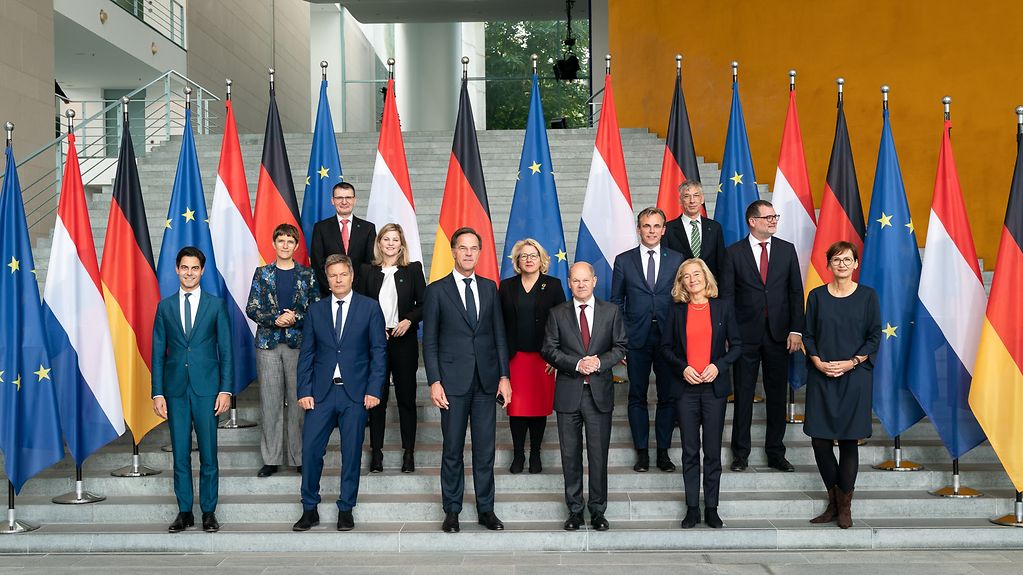German-Dutch climate cabinet
The governments of Germany and the Netherlands met for a climate cabinet in the Chancellery. The aim of the discussions between Federal Chancellor Scholz and Prime Minister Rutte: to intensify cooperation between the two countries on the path towards climate neutrality.

Germany and the Netherlands want to further intensify their relationship in terms of climate and energy policy.
Photo: Federal Government/Kugler
“Germany and the Netherlands are neighbours, close partners and friends – both in our bilateral relations and in our common efforts within the European Union and NATO,” said Federal Chancellor Olaf Scholz after consultations between the Federal Government and the Dutch government. This partnership proved its special significance particularly in these times of great challenges, he said, calling it a friendship which proves its value on a daily basis. “After all, it is the task of the century if we want to stop the climate crisis,” said Scholz.
Through the climate cabinet, Germany and the Netherlands aim to further intensify their relationship in terms of climate and energy policy – because, alongside the energy crisis, climate change is the greatest challenge of our age. In addition, both countries want to intensify their cooperation, particularly in the areas of offshore wind power and hydrogen. This was stressed by Federal Chancellor Scholz and Dutch Prime Minister Mark Rutte in the Chancellery.
Reducing greenhouse gas emissions
National climate policy measures to reduce greenhouse gases are fundamental in the fight against climate change. The development of renewable energies and the withdrawal from fossil energy sources play an essential role in this. The current energy crisis can also be understood as an opportunity to achieve climate neutrality more quickly. At the same time, both Germany and the Netherlands are keeping energy supply security in view as a top priority.
Alongside solar power, wind power plays an important role in developing renewable energies. Both Germany and the Netherlands will examine the potential for new, hybrid offshore wind parks in the North Sea. Such “energy hubs” provide green electricity to several states and contribute to supply security.
Developing the hydrogen infrastructure
The climate cabinet also offered the opportunity to discuss specific examples of closer cooperation between the two countries in climate and energy policy. This included presenting a joint call to promote innovations in the area of “electrochemical materials and processes for green hydrogen and green chemistry”. The funding amount envisaged is around ten million euros, which will be provided in equal parts by Germany and the Netherlands.
The Federal Chancellor and Prime Minister Rutte emphasised that they would accelerate the market ramp-up of green hydrogen together. The Dutch government is planning to participate financially in the “H2Global” initiative, which originated in Germany. Its aim is to give this key technology an investment boost by bundling the purchasing of hydrogen at regulated conditions.
In addition, the leaders of both governments, with the involvement of political decision-makers and transmission system operators, agreed to intensify cooperation to develop a hydrogen infrastructure between Germany and the Netherlands.
Accelerating international climate protection
Germany and the Netherlands share many of their priorities for negotiations at the EU level on the “Green Deal” and “Fit for 55 package”, as well as having similar positions with regard to the upcoming climate negotiations in Egypt in November. Both countries will argue on the international stage in favour of accelerating the reduction of greenhouse gases and supporting vulnerable states in adapting to climate change and in coping with climate change-related losses and damage.
At the G7 Summit in July 2022 in Elmau, the G7 heads of state and government had already resolved on accelerating the climate-friendly transformation of the industrial sector at an international level by an association of ambitious states.
“We need to be more ambitious if we want to meet our climate targets,” Federal Chancellor Scholz had stressed at the G7 Summit. At the Federal Chancellor’s suggestion, an open and cooperative climate club is to be founded by the end of 2022. Germany and the Netherlands will maintain a close dialogue within this context. In addition, the transfer of ‘best practice’ experiences between the German and Dutch national climate policies is to be further intensified.
Back in August 2019, the then Federal Government and the Dutch government had met in The Hague to discuss climate policy questions.